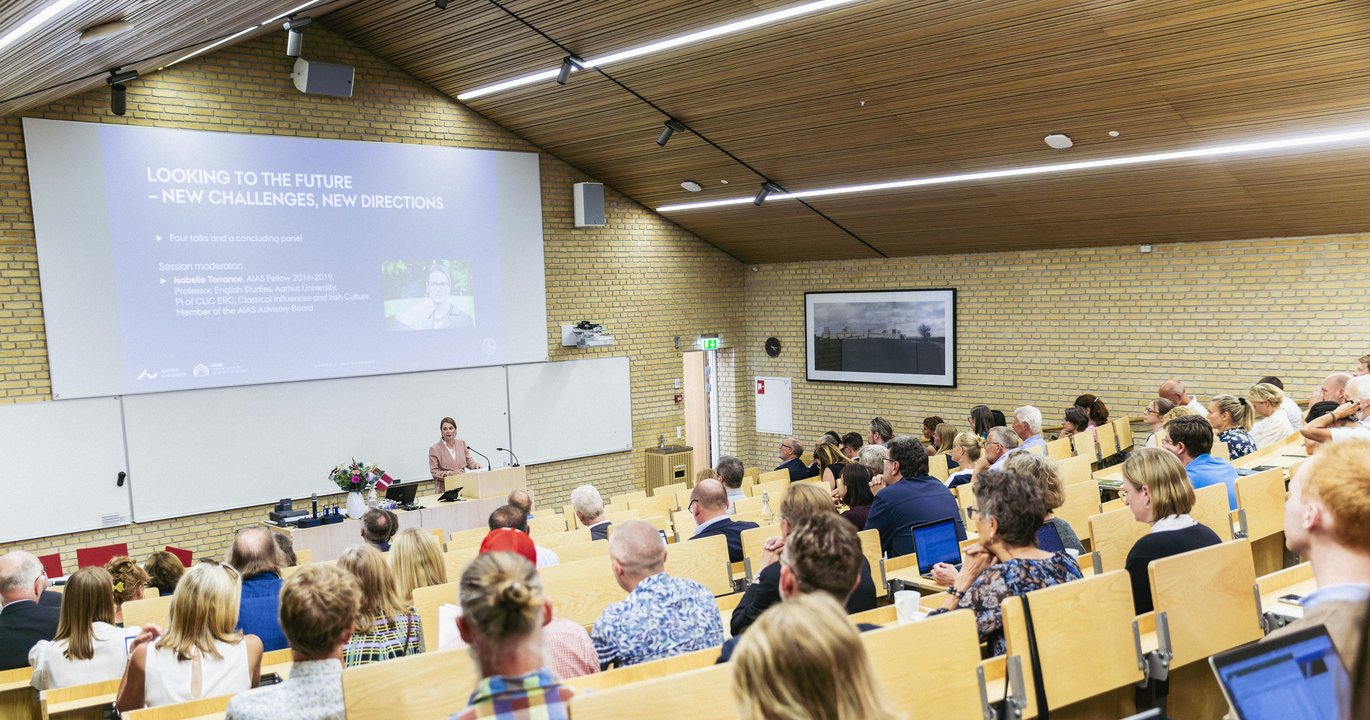Symposium: Flourishing at the University and Beyond
Organized by the Center for the Study of Ethics and Community, Aarhus University and Aarhus Institute of Advanced Studies

Info about event
Time
Location
AIAS Auditorium (bldg. 1632-201), Høegh-Guldbergs Gade 6B, 8000 Aarhus C
In recent years, the well-being of students has increasingly become a concern among university staff and management. Discussions about student well-being often focus on ‘mental health’. With this seminar, we would like to zoom out from this relatively narrow focus and launch a broader discussion of what well-being, or flourishing, may imply, and what may contribute to it, at the university and beyond.
Doret de Ruyter, Professor of Education at the University of Humanistic Studies in Utrecht, will start off the seminar with a keynote talk where she discusses what an understanding of flourishing as the central aim of education could mean for the organization of the university.
Following from this, AU-based scholars from different disciplines are invited to reflect on the overall question of what flourishing means and entails.
ONLINE ATTENDANCE
The symposium is held in-person but online attendance for Doret de Ruyter's talk from 10:15 - 11:00 is possible via:
https://aarhusuniversity.zoom.us/j/68029255900
PROGRAM
10:00 - 10:15: Maria Louw: Welcome and Introduction
10:15 - 11:00: Doret de Ruyter: Education for human flourishing at the university
Chair: Maria Louw
11:00-11:30: Discussion
PANEL 1: DIMENSIONS OF FLOURISHING
Chair: Anders Sybrandt Hansen
11:30 - 11:45: Cecilie Eriksen: Something fine to aim for' - philosophical reflections on existential meaning
11:45 - 12:00: Rikke Sand Andersen: What's livability got to do with it?
12:00 - 12:15: Hanne Bess Boelsbjerg: The fear of extinction – death as a motivational force (in academic contexts)
12:15 – 12:45: Discussion
12:45 - 13:30: Lunch
PANEL 2: FLOURISHING IN RELATIONS
Chair: Rasmus Dyring
13:30 - 13:45: Katrin Heimann, Jennifer Branlat, Siri Øyslebo Sørensen, Suneetha Saggurti and Sophia Martine Kleist Karlson: What it is like to be affirmed – a micro-phenomenological study about micro-affirmations in academia
13:45 - 14:00: Martijn van Beek: Cultivating responsIbility
14:00 - 14:15: Line Dalsgård: What can a breathing body bring to academia – and vice versa
14:15 - 14:45: Discussion
14:45 – 15:00: Break
PANEL 3: SPACES FOR FLOURISHING
Chair: Cecilie Eriksen
15:00 - 15:15: Lindsay Weinberg: Keeping Students "Safe": Campus Security in the digital Age
15:15 - 15:30: Susanne Højlund: Holding space. Handling complexity and energy in regenerative communities
15:30 - 16:00: Discussion
BIO
Doret de Ruyter (1964) is Professor of Philosophy of Education at the University of Humanistic Studies in Utrecht, the Netherlands since June 2018 and currently the Director of Education of the university. Before that time, she held a similar chair at the VU Amsterdam for 15 years. She is Assistant Editor of The Journal of Philosophy of Education and Theory and Research in Education.
Her research interests circle around human flourishing, ideals in education, moral and citizenship education and professional ethics. For a list of publications, see: https://www.researchgate.net/profile/Doret-De-Ruyter/research
ABSTRACT
During the COVID-19 pandemic there was a lot of attention for the well-being of students in universities, because surveys showed that many students suffered from (serious) mental health problems, like feelings of stress, depression and anxieties. After the pandemic this attention has remained, because the well-being of students is still a source of concern – in the Netherlands and other European countries.
One of the reasons given for the decline of students’ well-being is the impact of the meritocratic culture of European societies on the expectations of students’ achievements, also by students themselves. Fortunately, against the dominant emphasis on high educational and economic achievements and a concomitant focus on psychological mental health we see a shift to another aim of education, which I have defended for a long time, namely human flourishing. This has been recently adopted by organisations such as UNESCO and (even) the OECD.
In my talk, I begin with a short overview of theories about and empirical research into the well-being of students in universities and will argue that a single focus on psychological mental health should be avoided. The second part of the presentation concentrates on flourishing as the aim of education. I will explicate what I mean by ‘flourishing’ and describe what the pursuit of this aim (rather than the increase of human capital) could mean for the organisation of the university and in particular for the teaching staff. In the third part I will address two tensions that universities face if they adopt flourishing as the aim of education, namely between the high demands of universities versus the diversity in abilities of students and between the flourishing of students while they study and their future flourishing.
REGISTRATION
Registration has closed.
CONTACT AND ORGANIZER
Maria Louw, AIAS Monograph Fellow
Aarhus Institute of Advanced Studies
Aarhus University
Høegh-Guldbergs Gade 6B
8000 Aarhus C
